|
|
|
Sort Order |
|
|
|
Items / Page
|
|
|
|
|
|
|
| Srl | Item |
| 1 |
ID:
194495


|
|
|
|
|
| Summary/Abstract |
The political implications of population aging for democratic systems are fundamental. Questions of democratic legitimacy are raised as the political equilibrium between the generations is upended. Drawing on evidence from liberal democracies with a focus on Japan, the democracy with the oldest electorate, we identify and analyze three demographic effects on the political system: participation effects deriving from younger voters’ marginalization among the electorate; representation effects demonstrated by the dominance of elderly lawmakers inside the parliament and government; and policy effects manifesting in a preference for policies catering to an aging majority. By breaking down these key effects and contextualizing them in broader debates of political demography, we call attention to the normative repercussions of the interplay between demography and democracy and make a case for enhanced generational pluralism.
|
|
|
|
|
|
|
|
|
|
|
|
|
|
|
|
| 2 |
ID:
125004
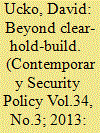

|
|
|
|
|
| Publication |
2013.
|
| Summary/Abstract |
Despite a highly uneven track record, clear-hold-build has remained a dominant, even universal, approach to counterinsurgency. Its prevalence is rooted in its incontestable sequencing of operations and the attendant promise of a linear path towards peace. Yet the appeal of this approach also makes it deceptive and possibly dangerous. Clear-hold-build is not a strategy and must not be mistaken for one, as it has been in Afghanistan, where it inspired false hope for swift progress. Instead, it is necessary to reach a more problematized view of this approach and of what it aims to achieve. This article provides such an evaluation, proposing five principles that should guide its future application. These principles point to the need for a far deeper understanding of how security, development, and governance interact at the local level. Counterinsurgents must understand the relationships between aid and security, between government and governance, and between state and periphery. Where the central government is predatory or lacks support, clear-hold-build also raises difficult questions of authority, legitimacy, and control - questions that counterinsurgents must be capable of answering. Thus problematized, clear-hold-build emerges as a framework with heuristic utility; a schema that can be helpful in planning but which must at the time of application be populated by knowledge, substance, and skill. The implications of these requirements are troubling, particularly for those governments still in the business of armed intervention.
|
|
|
|
|
|
|
|
|
|
|
|
|
|
|
|
| 3 |
ID:
133432
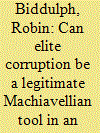

|
|
|
|
|
| Publication |
2014.
|
| Summary/Abstract |
Elite corruption may have a significant role in ending conflicts and shaping post-conflict development. This article enquires into the legitimacy accorded to such corruption. It reviews literature on post-conflict Cambodia, seeking evidence that academic commentaries, public opinion or elites themselves regard elite corruption as a legitimate Machiavellian tool for achieving other ends. Corruption has been an element of the style of government adopted by the dominant party in Cambodia, shaping both the achievement of peace and the uneven economic development that followed. Academic commentaries provide some implicit and explicit legitimation of corruption as a means to secure peace and to resist neoliberal policy settings by affording government discretionary resources and power. Meanwhile, public dissatisfaction with elite corruption appears to the most likely source of renewed violent conflict in Cambodia. How elite actors rationalise and legitimise corrupt behaviour remains poorly understood, and is deserving of more attention.
|
|
|
|
|
|
|
|
|
|
|
|
|
|
|
|
| 4 |
ID:
102112
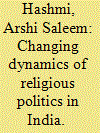

|
|
|
| 5 |
ID:
090904
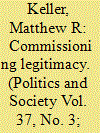

|
|
|
|
|
| Publication |
2009.
|
| Summary/Abstract |
Based on an analysis of the reports of twenty-eight national-level public commission inquiries into events involving ethno-national violence-drawn from five national contexts and arrayed over the course of the twentieth century-this article demonstrates the strikingly transnational character of these investigatory bodies' attempts to authoritatively explain episodes of collective violence and to thereby restore governing legitimacy in the wake of violent crises. One of four distinct "logics," or core explanatory frameworks, each associated with a particular mode of "racial power," characterized a diverse cross-national pool of violence commission reports during defined periods of the twentieth century. In revealing globally encompassing logics to what has often been framed as a national or case-specific phenomenon, the author shows how global ideational currents compose a key dimension of national political dynamics.
|
|
|
|
|
|
|
|
|
|
|
|
|
|
|
|
| 6 |
ID:
156107
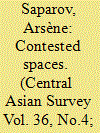

|
|
|
|
|
| Summary/Abstract |
This article deals with the political manipulation of symbolic landscape, using post-Soviet Azerbaijan as a case study. In particular, it looks at the practice of toponym changes as an element of political legitimization and national identity-making. The political use and manipulation of place-names and symbolic landscape is a relatively recent phenomenon that became particularly widespread in the twentieth century. It is widely used for ideological or nationalist purposes throughout the world – from Iran to Israel, from former Yugoslavia to the USSR. However, I argue that post-Soviet Azerbaijan represents an unusual case where one can clearly see strikingly different patterns of place-name manipulation in the pursuit of political legitimacy. It argues that while questions of political legitimacy and nationalism found their reflection in the policy of place-name manipulation, their uses followed clearly different routes and were confined to separate areas.
|
|
|
|
|
|
|
|
|
|
|
|
|
|
|
|
| 7 |
ID:
116664
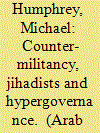

|
|
|
| 8 |
ID:
178974
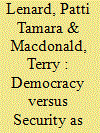

|
|
|
|
|
| Summary/Abstract |
Democratic citizens confront a range of problems framed as “security” issues, in policy areas such as counterterrorism and migration control, which place substantial political pressure on democratic norms. We develop a normative theoretical framework for assessing whether and how policies that curtail democratic governance standards in the name of security can be justified as politically legitimate. To do so, we articulate a novel normative account of legitimacy, which integrates insights from both democratic and realist traditions of thought to illuminate the complementary contributions of democratic and security standards to political legitimacy. We further elaborate a framework for applying this theoretical account to political practice in the form of a policy-focused “security test” for legitimacy in democratic states. Finally, we explore how this test may be deployed to help resolve policy dilemmas in democratic practice, by examining its application to a case study of national policy on irregular boat arrivals in Australia and Canada. Through this analysis, we contribute to the development of both richer theoretical understandings of the complex modern value of political legitimacy, and clearer action-guiding principles for balancing competing demands of legitimacy within securitized democratic policy regimes.
|
|
|
|
|
|
|
|
|
|
|
|
|
|
|
|
| 9 |
ID:
188055


|
|
|
|
|
| Summary/Abstract |
Many nonstate military organizations provide a wide range of social services to civilians. The apparent contradiction between their use of violence and their provision of charity has been the subject of a great deal of research in the conflict studies literature. Two of the most common sets of arguments hold that such services are either a form of bribery aimed at controlling and isolating constituents and potential recruits, or an extension of the organization’s ideological commitments. Our findings, based on a new analysis of the BAAD dataset, demonstrate that neither explanation is correct. Rather, we find that the provision of social services represents a means of confronting and undermining the authority of the state. In this sense, the provision of social services represents an extension of the broader political goals of the nonstate armed groups providing them.
|
|
|
|
|
|
|
|
|
|
|
|
|
|
|
|
| 10 |
ID:
131564


|
|
|
|
|
| Publication |
2014.
|
| Summary/Abstract |
This article reads Bashar al-Asad's rule through the prism of social activism and, in particular, through the field of charities. The sociopolitical transformations Syria experienced between 2000 and 2010-the shift in state-society relations, the opening of the civic arena, and economic liberalization-are explored through the activities of charitable associations, including their interactions with other Syrian actors, and we argue that they reflect the unraveling of the old social contract. The Syrian leadership outsourced important state welfare functions to charities while also creating nongovernmental organizations (NGOs) under its own control and supporting developmental NGOs loyal to the regime. These NGOs differed from the existing charities in terms of their social base, financial backgrounds, motivations, modes of institutionalization, and public relations strategies, and enabled the authoritarian regime to pursue a new strategy of divide-and-rule politics. At the same time, subcontracting poor-relief measures to charities eroded the regime's political legitimacy and helped sow the seeds of the 2011 uprising.
|
|
|
|
|
|
|
|
|
|
|
|
|
|
|
|
| 11 |
ID:
134063
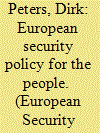

|
|
|
|
|
| Publication |
2014.
|
| Summary/Abstract |
The democratic foundations of European integration in the foreign and defence realm are increasingly being debated. This article looks at the question of democratic legitimacy from one particular angle, by examining public opinion as measured in Eurobarometer surveys between 1989 and 2009. Based on reflections about the relation between polling results and wider questions of democracy, it examines three aspects of public opinion: general support for a common foreign and a common defence policy; differences among support rates in EU member states; and what roles Europeans would prefer for European armed forces. It turns out that general support for a common foreign policy is high, whereas the desirability of a common defence policy is much more contested. Moreover, citizens across Europe would prefer European armed forces to take on traditional tasks, as territorial defence. An EU defence policy that goes beyond strict intergovernmentalism and is directed towards protecting international law and universal human rights would thus require a significant communicative effort to become accepted.
|
|
|
|
|
|
|
|
|
|
|
|
|
|
|
|
| 12 |
ID:
053783
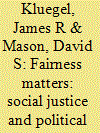

|
|
|
| 13 |
ID:
134750
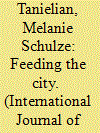

|
|
|
|
|
| Summary/Abstract |
World War I in the Ottoman Empire was a humanitarian disaster of unprecedented scale. By 1916 in the Greater Syrian provinces, men, women, and children were dying en masse of a war-induced famine so devastating that popular memory still names this war ḥarb al-majāʿa (the war of famine). Despite the civilian catastrophe, people's experiences on the Ottoman home front have been only marginally explored in the scholarship. Focusing on the city of Beirut, this article highlights the centrality of food provisioning in the competition for political legitimacy in the provincial capital. Through a detailed analysis of how the Beirut municipality was represented in the city's daily newspaper al-Ittihad al-ʿUthmani, I argue that for local reform-minded notables and intellectuals the war presented an opportunity to prove, both to the local population and to the Ottoman state, that issues related to the internal security and well-being of the Beirut province generally and the city specifically could be dealt with locally through existing governing bodies. The article thus traces the fierce political games played around the issue of food by various actors seeking to win the hearts of Beirutis through their stomachs.
|
|
|
|
|
|
|
|
|
|
|
|
|
|
|
|
| 14 |
ID:
173834


|
|
|
|
|
| Summary/Abstract |
This paper examines Frances Fitzgerald’s Fire in the Lake in the context of wider ethnological research in Vietnam stretching back to the Francophone era of Paul Mus in the 1930s and 1940s. It argues that Fitzgerald’s heavily criticised book was important for raising uncomfortable issues of political legitimacy in the US military involvement in Vietnam as well as feeding into wider debates on social revolution in Vietnam and Indochina more generally. The paper concludes by arguing that Fire in the Lake has helped shift the focus in the study of Vietnam from a western-oriented, orientalist focus on American military and political mistakes towards an emphasis on the Vietnamese rebuilding of a postcolonial society anchored in Confucian precepts and values.
|
|
|
|
|
|
|
|
|
|
|
|
|
|
|
|
| 15 |
ID:
131996
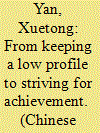

|
|
|
|
|
| Publication |
2014.
|
| Summary/Abstract |
Since 2012, some scholars, both Chinese and foreign, have argued that China's assertive foreign policy is doomed to fail. Nevertheless, after examining China's foreign relations in the last two years, this paper finds that China has experienced improved relations rather than deteriorating ones. In comparison with the strategy of keeping a low profile (KLP), the strategy of striving for achievement (SFA) shows more efficiency in shaping a favorable environment for China's national rejuvenation. The author applies the theory of moral realism to explaining the role of the SFA strategy and argues that morality can increase both international political strength and the political legitimacy of a rising power. The key difference between the KLP and the SFA is that the former focuses on economic gains and the latter seeks to strengthen political support. That is the reason that the SFA values the role of morality and the KLP does not. Due to these different goals, the SFA strategy differs from the KLP strategy in aspects of tenets, general layouts, working approaches, and methods. So far, the SFA has achieved progress beyond people's expectation from Xi Jinping in 2012. Xi's strong leadership may become a new case suitable for illustrating the theory of moral realism.
|
|
|
|
|
|
|
|
|
|
|
|
|
|
|
|
| 16 |
ID:
193630


|
|
|
|
|
| Summary/Abstract |
Drawing on a variety of material—mass and social media texts, government reports, and everyday observations—this article examines two interrelated dynamics in Malaysia in 2020–2021: the COVID-19 pandemic’s unfolding local trajectory and the short-lived Perikatan Nasional (PN) coalition’s governance capacity. Despite political instability resulting from this government’s rise to power following internal political manouevrings, it managed to effectively control a major wave of cases with the help of a centralized healthcare system manned by permanent professional staff and the imposition of coercive measures. Thus, Malaysia’s success in “governing” the early phase of the pandemic is arguably attributable to its strong state infrastructure, notwithstanding the untimely unfolding of this political coup. However, an ideal type approach—that is, concern with state capacity—is inadequate in making sense of subsequent failures to control the pandemic after a state election took place several months later. Using Migdal’s “state-in-society” approach, this article focuses on the political process of pandemic governance to shed light on Malaysia’s shifting state capabilities. Arguably, the resulting shifting responses were mainly shaped by: (1) continuous partisanship; (2) PN’s internal fragmentation; (3) PN’s complacency in initially “flattening the curve”; and (4) poor governance during the state election.
|
|
|
|
|
|
|
|
|
|
|
|
|
|
|
|
| 17 |
ID:
131637
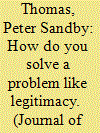

|
|
|
|
|
| Publication |
2014.
|
| Summary/Abstract |
Previously in this journal, Gunter Schubert's article, entitled 'One-party rule and the question of legitimacy in contemporary China', called for the setting up of a new research agenda to analyze the legitimacy of the Chinese Communist Party (CCP). While making a valuable contribution to the study of the CCP's legitimacy, Schubert's emphasis on the empirical measurement of this concept gives rise to a number of conceptual and theoretical issues. As a consequence, this article seeks to contribute to the research agenda by addressing these issues. In so doing, it suggests that a shift away from a narrow empirically-measured focus on legitimacy towards a broader conceptually-driven concern with legitimation would allow for a more inclusive agenda within the China studies community and lead to a more complete understanding of why the CCP remains in power.
|
|
|
|
|
|
|
|
|
|
|
|
|
|
|
|
| 18 |
ID:
071629
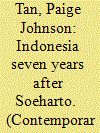

|
|
|
|
|
| Publication |
2006.
|
| Summary/Abstract |
This article examines what the performance of Indonesias political parties seven years on from Soehartos resignation can tell us about politics in the country. Using the party system institutionalization framework first developed by Scott Mainwaring and Timothy Scully in Building Democratic Institutions: Party Systems in Latin America (1995), the article finds that Indonesias parties and party system show a mixed score card, strengths and weaknesses mixing to deprive the parties of legitimacy. On balance, the 2004 elections and 2005 regional elections represent a step towards further deinstitutionalization due to the primacy of personalities in the direct elections of the president and the regional heads. Democracy may indeed now be the only game in town, but its operation is likely to be rocky. There is a silver lining, however; accountability has been somewhat improved due to the electorates realization of its power to reward and punish parties and political leaders.
|
|
|
|
|
|
|
|
|
|
|
|
|
|
|
|
| 19 |
ID:
132289


|
|
|
|
|
| Publication |
2014.
|
| Summary/Abstract |
Islam's diversity is a direct result of centuries of schism and factionalism, and presents a challenge to the original spirit of unity as envisaged by its founder, the Prophet Mohammed. Rivalry within Islam undermines the precedent notion of unity through communal belonging (tawhid and ummah). Yet in the twenty-first century this diversity is ignored, and political Islam is represented as being more of a monolith than a spectrum of ideas and aspirations. Generally, the materialization of new Islamist groups is a challenge to those who hold that unity is all. In the Gaza Strip, specifically, the dominant Islamist actor, Hamas, is facing internal challenges from other Islamist elements. These rival Islamists are also influenced by events across their border in post-revolutionary Egypt where a plethora of new Islamist actors are vying for political space and power. This article deals with Hamas's Islamist rivals, and the effects they have had on Hamas's governance of the Gaza Strip, and political and religious legitimacy within it. It will focus on ideological and violent disputes between the Islamist elements in Gaza, and the means by which Hamas and its security elements have tackled newly emerging rivals.
|
|
|
|
|
|
|
|
|
|
|
|
|
|
|
|
| 20 |
ID:
046193
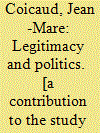

|
|
|
|
|
| Publication |
Cambridge, Cambridge University Press, 1997.
|
| Description |
xxviii, 259p.
|
| Standard Number |
0521787823
|
|
|
|
|
|
|
|
|
|
|
|
Copies: C:1/I:0,R:0,Q:0
Circulation
| Accession# | Call# | Current Location | Status | Policy | Location |
| 046100 | 323/COI 046100 | Main | On Shelf | General | |
|
|
|
|
|
|
|
|
|